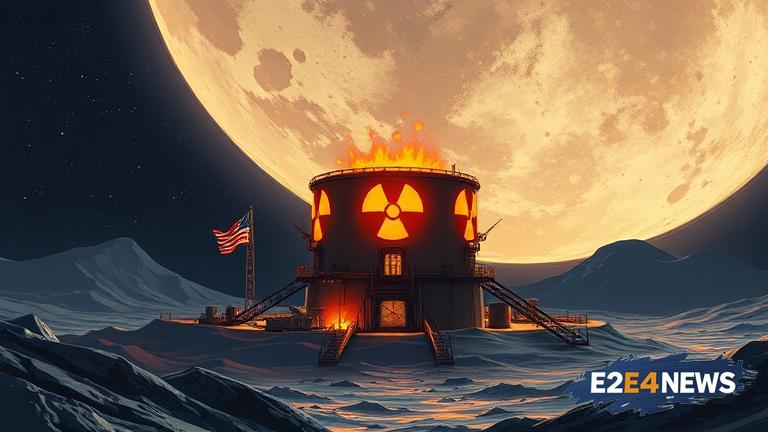The Trump administration’s recent announcement to build a nuclear reactor on the moon has sent shockwaves throughout the scientific community. The plan, proposed by NASA’s administrator, Sean Duffy, aims to establish a sustainable human presence on the lunar surface. The nuclear reactor would provide a reliable source of energy, enabling the construction of a permanent lunar base. However, critics argue that the plan poses significant risks, including the potential for nuclear accidents and the contamination of the lunar environment. Despite these concerns, the Trump administration remains committed to the project, citing its potential to advance American interests in space. The plan has also sparked debate about the ethics of nuclear energy and the long-term consequences of establishing a human settlement on the moon. Proponents of the plan argue that it could pave the way for further space exploration and the development of new technologies. On the other hand, opponents warn that the risks associated with nuclear energy far outweigh any potential benefits. The plan has also raised questions about the role of private companies in space exploration, with some arguing that they should play a greater role in funding and developing space-related projects. As the debate continues, it remains to be seen whether the Trump administration’s plan will come to fruition. The project’s success will depend on a range of factors, including the development of new technologies and the ability to mitigate the risks associated with nuclear energy. The moon’s surface is a harsh environment, with extreme temperatures and radiation posing significant challenges to any human settlement. Despite these challenges, the Trump administration remains committed to the project, citing its potential to advance American interests in space. The plan has also sparked interest from other countries, with some expressing interest in collaborating on the project. However, others have expressed concerns about the potential risks and the need for greater international cooperation. The United Nations has also weighed in on the debate, calling for greater caution and careful consideration of the potential risks. As the world watches, it remains to be seen whether the Trump administration’s plan will succeed or fail. The project’s outcome will have significant implications for the future of space exploration and the development of new technologies. The use of nuclear energy in space is a complex issue, with both proponents and opponents presenting compelling arguments. Ultimately, the decision to proceed with the project will depend on a careful weighing of the potential risks and benefits. The Trump administration’s plan has sparked a lively debate, with some hailing it as a bold move and others warning of big risks. As the debate continues, it is clear that the project’s success will depend on a range of factors, including the development of new technologies and the ability to mitigate the risks associated with nuclear energy. The moon’s surface is a harsh environment, and any human settlement will require careful planning and preparation. The Trump administration’s plan has also raised questions about the role of government in space exploration, with some arguing that it should play a greater role in funding and developing space-related projects. On the other hand, others argue that private companies should play a greater role in space exploration, citing the potential for innovation and cost savings. The plan has also sparked interest from the scientific community, with some expressing excitement about the potential for new discoveries and others warning about the potential risks. The use of nuclear energy in space is a complex issue, and the Trump administration’s plan has sparked a lively debate. As the world watches, it remains to be seen whether the project will succeed or fail. The outcome will have significant implications for the future of space exploration and the development of new technologies.
